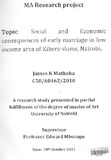| dc.description.abstract | This research project brings out the social and economic condition of married adolescents girls in slum areas of Nairobi. It explore the counterintuitive assumptions that early marriage is a rural phenomenal. It is commonly assumed that early marriage only occurs in rural life style where cultural beliefs are more practiced and entrenched. Yet in urban centre, especially in slum areas such as Kibera, more girls are married before reaching 18 years. Nairobi attracts migrants from rural areas in search of education and livelihood opportunities. These migrating adolescents girls from rural in search for better prospects have no or very little social capital, little or no education, limited social network or trusted relationships and few economic opportunities. Many of the new migrants into Nairobi are also double disadvantaged because they live apart from the protective structures of family and away from communities where they are known and have reliable social network.
To many of these adolescents, life in Nairobi is effectively life in the slums. Marriage therefore becomes an easier option to many of them. Results from this research project challenge the assumptions about girls programming and raises several questions about meeting the needs of our youth. Both Quantitative and Qualitative method of research were used. Using snowballing sampling, the study brought on board 31 married girls within a very short time. The results of this study prove that the problem of early marriage is bigger than usually reported. These girls face high level of isolations and limited job opportunities. Considerable number of married girls reported some form of physical violence often perpetrated by their spouses. Some married girls even blame themselves for the violence for fear of reprisal. This situation, combined with existence of risk behaviors', such as unprotected sex, gender based violence, political unrest and disturbing numbers of young girls who are unaware of basic human rights could slow down Kenyans efforts to achieve
five of the eight MDGs by 2015. | en_US |

